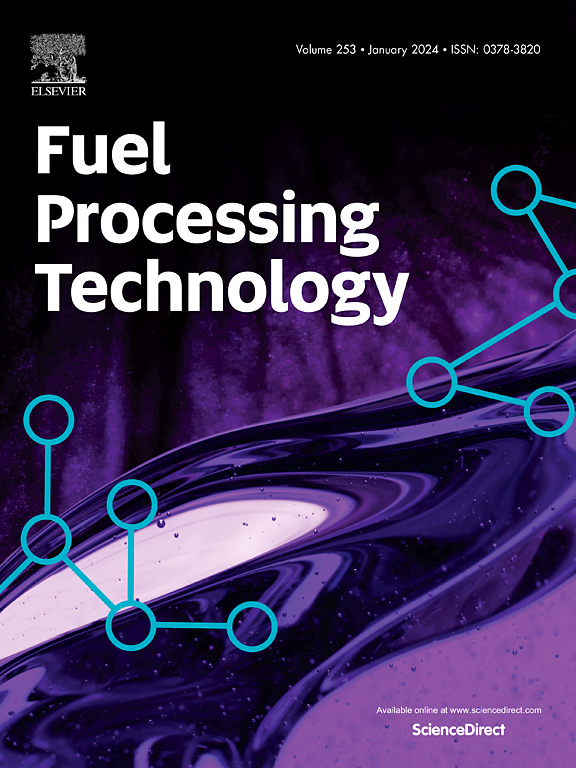Influence of fly ash components on the performance of recycled copper-based oxygen carriers for chemical looping combustion
IF 7.7
2区 工程技术
Q1 CHEMISTRY, APPLIED
引用次数: 0
Abstract
Copper-based, silica-supported oxygen carriers were prepared with low concentrations of metal oxide impurities representing solid-fuel ash components that would co-leach when using nitric acid to recover copper oxide from spent fluidized bed materials in a solid-fuel-fired chemical looping system. Oxygen carriers were prepared to contain approximately 30 wt% CuO on a high surface area silica support with metal oxide impurity-to-CuO ratios of 1:100. Both single- and multi-impurity materials were considered with impurities being introduced as aqueous nitrates during synthesis. Many of the prepared oxygen carriers exhibited lower oxygen transport capacity than expected due to support-CuO interactions. Multi-impurity oxygen carriers displayed the best performance, even better than material containing only CuO, and the presence of alkali salts was determined to be important for enhancing oxygen transport capacity and reaction rates. All oxygen carrier materials were highly reactive, with oxidation and reduction achieving near completion within two minutes at 950 °C. This study concludes that the presence of impurities is not detrimental to oxygen carrier performance and a simple, low-cost oxygen carrier recycle process could be viable. With such a recycle process, it would be possible to reduce the make-up cost associated with the loss of oxygen carriers due to attrition, thus improving economics of chemical looping combustion.
粉煤灰组分对化学环燃烧用再生铜基氧载体性能的影响
在固体燃料化学循环系统中,当使用硝酸回收废流化床材料中的氧化铜时,以低浓度的金属氧化物杂质为代表的固体燃料灰分成分制备了铜基二氧化硅负载的氧载体。在高表面积的二氧化硅载体上制备了含有约30 wt% CuO的氧载体,金属氧化物杂质与CuO的比例为1:100。考虑了单杂质和多杂质材料,在合成过程中杂质作为水硝酸盐引入。许多制备的氧载体表现出较低的氧运输能力比预期的由于支持-氧化铜相互作用。多杂质氧载体表现出最好的性能,甚至优于只含CuO的材料,碱盐的存在对提高氧运输能力和反应速率很重要。所有的氧载体材料都是高活性的,在950°C下,氧化和还原几乎在两分钟内完成。本研究的结论是,杂质的存在不会损害氧载体的性能,一种简单、低成本的氧载体回收工艺是可行的。有了这样的回收过程,就有可能降低由于磨损而导致的氧载体损失的补充成本,从而提高化学循环燃烧的经济性。
本文章由计算机程序翻译,如有差异,请以英文原文为准。
求助全文
约1分钟内获得全文
求助全文
来源期刊

Fuel Processing Technology
工程技术-工程:化工
CiteScore
13.20
自引率
9.30%
发文量
398
审稿时长
26 days
期刊介绍:
Fuel Processing Technology (FPT) deals with the scientific and technological aspects of converting fossil and renewable resources to clean fuels, value-added chemicals, fuel-related advanced carbon materials and by-products. In addition to the traditional non-nuclear fossil fuels, biomass and wastes, papers on the integration of renewables such as solar and wind energy and energy storage into the fuel processing processes, as well as papers on the production and conversion of non-carbon-containing fuels such as hydrogen and ammonia, are also welcome. While chemical conversion is emphasized, papers on advanced physical conversion processes are also considered for publication in FPT. Papers on the fundamental aspects of fuel structure and properties will also be considered.
 求助内容:
求助内容: 应助结果提醒方式:
应助结果提醒方式:


